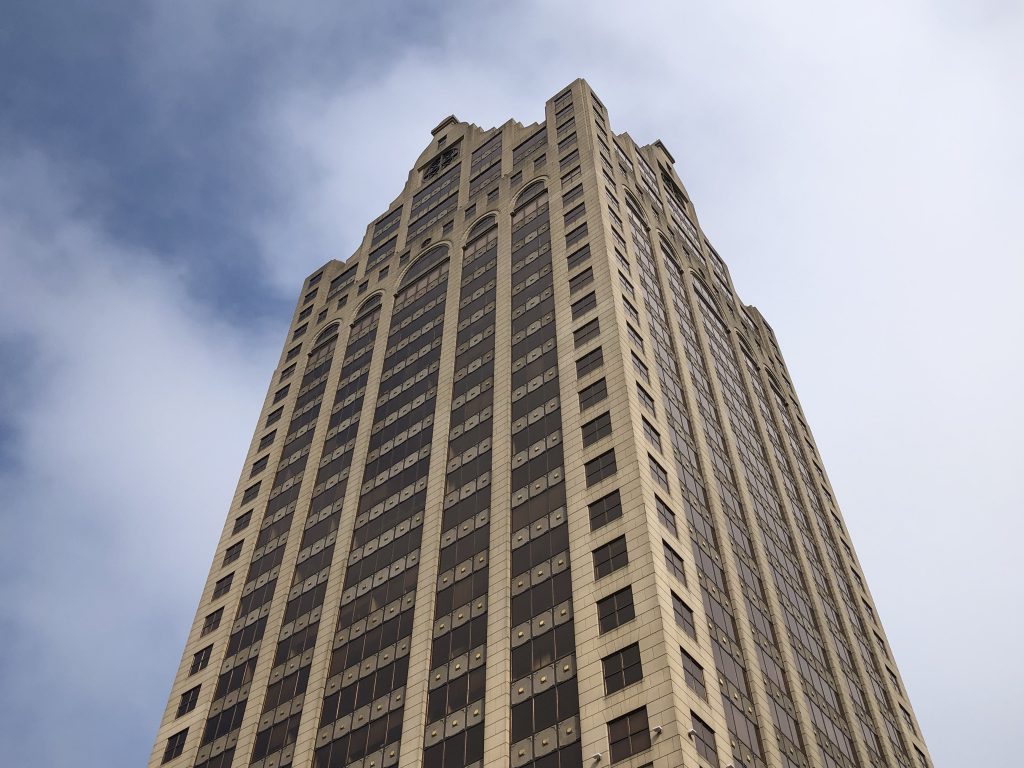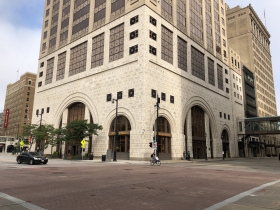Mostly Vacant 100 East Tower Sells For $29 Million
Plus: Advertising firm moves to Walker's Point and a recap of the week's real estate news.
An ailing downtown office tower is under new ownership, though a plan to convert it into housing won’t immediately result in construction.
A partnership of developers Johnny Vassallo, Joe Klein and Klein Development completed their purchase Thursday of the 35-story 100 East office tower.
“We are excited to add the density of people in the community that can work, live and shop,” Vassallo told Sean Ryan, who was the first to report the news. “We’re excited it’s going to be a beautiful, Class A building, and we’re also excited to help move some of these (office) tenants, spread them around and shore up the rest of the office space in the city.”
The partners were revealed earlier this year as the winning bidders to purchase the property out of foreclosure. They plan to create approximately 350 apartments in the 435,537-square-foot building.
The tower is more than half empty, with Marcus Corp. and Gruber Law Offices representing the two largest remaining office tenants. Wells Fargo is relocating to the 833 East building. The desirability of the building for office use has declined as new buildings have featured more natural light, more efficient floor plans and more tenant amenities.
Renovation plans remain to be finalized, but conceptually include replacing all of the windows and removing a number of walls. Work will not begin for at least a year, pending the moveout of the remaining tenants.
The tower was completed in 1989. It is the third-tallest building in Wisconsin. Until the foreclosure action started, it was one of the 10 most valuable properties in the city. The sale includes both the office tower and the skywalk-connected parking structure at 718-722 N. Water St.
The Klein family previously partnered with Vassallo to redevelop the mostly-vacant Posner Building into MKE Lofts. That partnership came via HKS Holdings, which includes Joe Klein as a partner.
Vassallo is an entrepreneur best known to Milwaukee residents for his Mo’s Irish Pub and Mo’s steakhouse. He recently canceled plans for a 28-story tower in Wauwatosa and said he will instead develop a car wash at the site. Vassallo has developed housing in other markets and is also invested in other businesses, including scooters.
Urban Milwaukee previously examined how the building’s declining value is likely to increase the property tax bill of the average Milwaukee homeowner by $4. But a successful redevelopment of the building to 350 apartments could be more valuable than the office building was at its peak and reverse the impact. Furthermore, the effects of improving the downtown office market by reducing the amount of space and pushing the remaining tenants into other properties could also raise assessments at other office buildings.
Photos
UPDATE: An earlier version of this article referenced the building as the second tallest, it is the third.
SRH Moves to Eagleknit Building
Advertising and communications firm SRH now calls Walker’s Point home.
The company has relocated to the third floor of the Eagleknit Innovation Hub, 507 S. 2nd St., occupying an approximately 6,800-square-foot suite.
The firm relocated from leased space in Brewers Hill, more than doubling its footprint along the way. HGA served as the architect of record on the buildout, which a permit lists as $135,000. Colliers International represented SRH in its lease negotiations.
SRH is led by Matt Sabljak, Kurt Ravenwood and Sam Hogerton.
Built in 1928, the building contained 107,000 square feet of space before Wangard Partners constructed a 30,000-square-foot, glassy southern addition in 2021 as part of a $30 million redevelopment. Eagleknit Knitting Mills operated in the building for several decades. Wangard acquired the property for $3.51 million in 2017. As of November 2022, Wangard reported more than 50,000 square feet of space remained available for lease. It announced 10 new tenants that month in addition to long-term tenant CenturyLink, which operates a data center in the building.
Forward Community Investments and Minlopro Partners also relocated to the building, taking up space on the second floor, earlier this year.
Weekly Recap
Northridge Mall’s Fate Hinges On Appeals Court Ruling, Second Attorney Quits
The future of the shuttered Northridge Mall awaits the ruling of a three-judge panel at the Wisconsin Court of Appeals.
Milwaukee County Circuit Court Judge William Sosnay reiterated during a hearing Friday morning that he is prepared to rule once a decision comes down. The mall’s Chinese ownership group, U.S. Black Spruce Enterprise Group, is appealing Sosnay’s 2022 ruling that the city’s raze order for the approximately 900,000-square-foot complex is valid.
If the appeals court affirms Sosnay’s earlier ruling, the judge indicated he is poised to rule on the city’s request to take ownership of the property in lieu of the unpaid fines. “The court is not going to wait six months or a year,” said Sosnay, who has repeatedly pledged not to delay since inheriting the 2019 case in 2022.
The next hearing is scheduled for Sept. 29. “Should we get a decision before the 29th, my clerk will probably call you to see if we can address this sooner,” said Sosnay. An open raze order stands on the property, which requires Black Spruce to demolish the structure or gives the city the ability to step in to demolish it and place the cost, estimated at several million, on Black Spruce’s property tax bill. The city, citing an undisclosed source of funds to perform the work, has asked for title to the property instead of waiting to resolve the matter through property tax foreclosure.
Custom Shipping Container Company Will Take Over Former Fiebrantz Station
Milwaukee County is poised to sell the former Fiebrantz Bus Station for $500,000 to a pair of buyers that plan to employ as many as 24 people at the facility.
Entrepreneurs and business owners Tom Daugherty and Lyle Stoflet want to relocate two of their businesses, Containers Up and Green Frog, to the 90,000-square-foot facility.
In July, Milwaukee County revealed there was a buyer for the former Milwaukee County Transit System (MCTS) property at 1900 W. Fiebrantz Ave. to MKE Northside LLC, Daugherty and Stoflet’s firm, but additional details were limited.
A new report from the county’s Economic Development Division shows that Stoflet and Daugherty plan to relocate the manufacturing processes for two of their business. Containers Up is a manufacturing company that uses shipping containers for custom outdoor bars and buildings. Green Frog is a portable toilet rental company.
A New Westside Home For Creatives
A two-and-a-half-story building across from Washington Park on the city’s West Side is now home to two creative businesses and could be joined by several more.
Sara Daleiden of MKE<->LAX and Wes Tank of TankThink completed their renovation earlier this month of the 3,500-square-foot building at 4303 W. Vliet St.
Now known as the Washington Park Media Center, the space is designed to “serve creators of all skill levels, in any stage of their media-making journey.”
The partners provide space and equipment for filming, photography, pdocasting, live streaming, hybrid events and multimedia installations.
County Could Fund Greenfield Affordable Housing Project
Milwaukee County’s Housing Division is recommending $2.5 million in funding for a new affordable housing development in Greenfield.
The project is a 45-unit development planned by Horizon Development Group in Greenfield near the intersection of S. 99 Street and W. Layton Avenue. The project would include 38 units for seniors with an annual income at or below the county median and seven townhomes rented to families earning no more than 50% of the county median income ($25,000 and less).
In 2022, Milwaukee County set aside approximately $15 million in COVID-19 stimulus funds to support affordable housing projects in suburban Milwaukee Communities. The proposal was part of a policy priority of County Executive David Crowley to support affordable housing in the county, especially in areas that have historically not had it.
The housing division would like to allocate funding to a Horizon Development Group project called Layton Preserve Apartments. This $13.6 million development will include a three-story, 38-unit apartment building renting to residents 55 years or older and a separate seven-unit townhome-style building with detached garages for families. Both buildings will be income-restricted.
Common Ground Expands Campaign Against City Housing Authority
Common Ground, a broad-based coalition, isn’t backing down on its Tenants United campaign against the Housing Authority of the City of Milwaukee (HACM).
Launched in March, the campaign targets the alleged poor conditions, bad management and retaliatory behavior within the public housing agency. It has now been expanded to include allegations of “negligence around rent collection and their utter disregard for the emotional stress and economic hardship this is causing residents.” That includes wrongful late fees, “lost” payments, erroneous back rent charges and myriad other issues.
The group held a follow-up event Monday night at Metropolitan Missionary Baptist Church, 1345 W. Burleigh St., to air its latest claims and publicly call for the U.S. Department of Housing and Urban Development (HUD) to audit HACM.
“Knowing that your system is erroneously charging late fees and not doing anything about it, that’s stealing,” said pastor Will Davis of Invisible Reality Ministries and a Common Ground executive team member.
City Regulators Can Require Fixing of Lead Hazards — If They Can Find Landlords
It was one landlord. And another. And another.
By the time Deanna Branch learned of severe lead hazards in her home several years ago, she wasn’t even sure who owned the North Side Milwaukee house she was renting.
When her son Aidan was sent to the hospital for the second time with severe lead poisoning, the Milwaukee Health Department initially struggled to find the landlord responsible for removing the hazards — a problem the department says it often encounters.
How Milwaukee Could Have Hosted The 2028 Summer Olympics
You’ll never be able to say Jay Sorgi doesn’t have big dreams.
The veteran sports radio personality has released a book, Greater Than The Games, that details his efforts to bring the 2028 Summer Olympics to Milwaukee and, with a substantial amount of detail, how things would actually work before, during and after.
“Launch a city, and heal it simultaneously,” wrote Sorgi of his vision for a city he said needs to embrace its history as “The Gathering Place.”
The vision called for 25 of the 39 venues to be within Milwaukee County, nine elsewhere in Wisconsin and five in Chicago. “The most compact plan for a game in almost 100 years,” says Sorgi, noting that every venue would be within two hours of the Olympic Village, in a preview of the book. The housing and stadium complex, Olympic Harbor, was to be built where Bay View meets the Harbor District, stretching along E. Bay Street from Barnacle Bud’s to the lake and connected to the rest of the “Lake Michigan Triangle” by a new rail system.
City Sees 1.14% New Construction Growth
Every year at this time all of Wisconsin’s 1,253 towns, 411 villages and 190 cities must assemble a budget for the upcoming year. The first step is to calculate the prior year’s adjusted levy — the total amount of taxes billed by the municipality. The second is to determine the amount of net new construction in the previous year.
This is a key figure for budget officials, for that is the amount by which the levy may be increased.
Symposium Is All About Milwaukee’s Iconic Bricks
Milwaukee is known as the Cream City, but no, it’s not about the beer.
The name is a reference to the cream-colored bricks that clad many of the city’s 19th-century buildings. Made with Menomonee Valley clay, the distinctive brick became a defining architectural feature for the city and served as a regional export for decades. But you won’t find any new Cream City brick being made today, a result of a shift to mass production and easier-to-produce competitors.
A symposium from the Milwaukee Preservation Alliance (MPA) and AIA Milwaukee will focus on how to preserve, clean and revitalize the remaining brick for the next century.
The one-day event is being held Sept. 8 at Best Place at the Historic Pabst Brewery, 917 W. Juneau Ave.
Milwaukee Gets National Award for Collaborative Housing Program
The U.S. Department of Housing and Urban Development has honored the Greater Milwaukee Foundation for working on housing issues with the Community Development Alliance.
Since 2020, the alliance – an affiliation of community development funders and practitioners – has led Milwaukee’s first collective affordable housing plan, which advocates for racial equity through systemic change, including creating opportunities for 32,000 Black and Latino residents to become homeowners.
“2020 was when the funders and other folks said: ‘We need to focus on housing. We’re in a housing crisis. Let’s focus on housing,’ “ said Teig Whaley-Smith, Community Development Alliance’s chief alliance executive. “And that’s what was the impetus of doing the plan.”
In June, the Greater Milwaukee Foundation, a founding partner and a principal funder of the alliance, received the 2023 U.S. Department of Housing and Urban Development Secretary’s Award for Public-Philanthropic Partnerships for its work with the alliance.
If you think stories like this are important, become a member of Urban Milwaukee and help support real, independent journalism. Plus you get some cool added benefits.
Plats and Parcels
-
New Third Ward Tower Will Be Milwaukee’s Priciest
 Mar 3rd, 2024 by Jeramey Jannene
Mar 3rd, 2024 by Jeramey Jannene
-
New Corporate Headquarters, 130 Jobs For Downtown
 Feb 25th, 2024 by Jeramey Jannene
Feb 25th, 2024 by Jeramey Jannene
-
A Four-Way Preservation Fight Over Wisconsin Avenue
 Feb 18th, 2024 by Jeramey Jannene
Feb 18th, 2024 by Jeramey Jannene

























